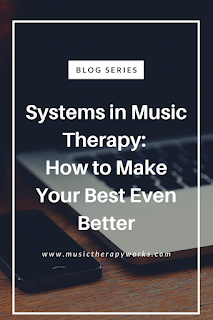Systems in Music Therapy: A Different Kind of System
Last night, I attended a webinar hosted by Alverno College that was led by Jenny Cook-McKenna. The title of the webinar was "The Genealogy of Music Therapy Theory," a topic that merges into my areas of interest in music therapy very nicely. I was not disappointed at all with the topic. It further strengthens my resolve to find the commonalities between music therapists while acknowledging some of the differences we have as well.
Are you confused? Let me explain a bit more.
All of my music therapy life, I have been baffled by the attitudes of some music therapists towards others that practice within a different philosophy of music therapy. I have been the recipient of these attitudes several times, and it makes me wonder why we have these thoughts and feelings in our profession. I have removed myself from many of the places where people seem to profess their beliefs that their way of doing music therapy is the only way to do things because I cannot fathom a helping profession where people spend time denigrating people who practice from a different perspective than their own. So, I am not sure how much of this type of talk is going on in other social media feeds anymore, but I know that there are still people who are not willing to acknowledge that we all have the right to make decisions about how we engage with others based on our own experiences, situations, and life-circumstances. As far as I am concerned, there is NO room for bullies in the profession of music therapy.
I feel that there is something about the profession of music therapy that is true for all who are music therapists, regardless of what we profess to believe about music therapy. I call this the "Grand Unifying Theory of Music Therapy" (with apologies to the world of physics where the concept of a "Grand Unifying Theory" comes from!), For me, the most obvious place to start is with our medium - music. When you start to read about how we all interpret music and work within the music, though, you find some very different ideas and approaches as well. The one thing that unites us more than everything else, is music of some sort - an organization of sounds and silences with the intent to affect change of some sort.
I continue on my journey of organizing the information that we have into something that I feel unites us more than divides us.
So, when I saw the title of the free webinar, I found that it intrigued me. I am happy to say that the time spent was more than worth it for me! I have to go through my notes and organize things the way I think, but the presentation by Jenny Cook-McKenna organized many of the theoretical perspectives that music therapists have adopted as guides into a way that indicates how ideas entered the music therapy world and how they influenced one another.
So, are you wondering why I consider this dive into music therapy history a system?
My philosophical perspective in the world of music therapy is a system for me. It informs my approach towards how I engage in the professional world, how I engage with my clients, and what I want others to know about me and what I believe about music, about therapy, and about my therapeutic use of self. This is a system, and it is one that I am constantly pondering and figuring out. I have always been able to expand my system to accommodate other ideas and appropriate techniques into what I believe.
I think that we have to understand things about how music therapy theory and philosophy and viewpoints and techniques evolve, adapt, and grow into "ways I do things with my music therapy clients." Without a firm foundational knowledge of how these ideas came to be or when they came to be or why others felt that ideas needed to be changed from the status quo, we do not fully understand how or why others resist the idea.
Thank you, Becky Engen and Leslie Henry, for bringing the thoughts of Jenny Cook-McKenna to those of us around the country. Jenny Cook-McKenna, thank you so much for organizing these ideas into the genealogy format in a way that helps to indicate that we are very much connected within our system of music therapy.


Comments
Post a Comment